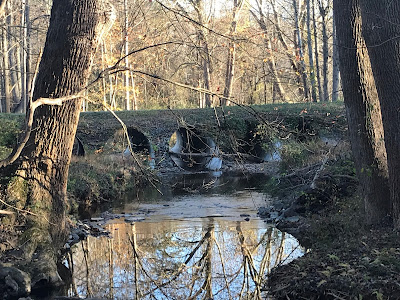Turning Back

A hike yesterday on less familiar ground, light slanting low from the late-afternoon sun. Only a short way down the trail came a fast-moving stream and what was billed as a “rock crossing” on the map but which was in fact a few slick stepping stones spread far apart and barely peaking their razor-thin edges above the rushing water.
The first few stones of the crossing looked treacherous but feasible. If they weren’t so moss-slicked I could see getting across them. But then I’d be in the middle of the creek, and, from what I could tell, stranded. I could see only the barest, thinnest edges to the mostly submerged rest of the stone crossing.
Feeling distinctly wimpy, I turned back. I don’t like turning back; it goes against my nature. So I found a side path to explore. It followed the stream for a few minutes, close enough to glimpse an ancient roadbed (see above), which seemed part of an old watercourse.
I felt better, realizing that waterworks would have remained hidden had we taken the original crossing. And this morning, reading a description of this section of the Cross-County Trail, I felt even better about turning back.
It describes a “stone crossing that is only usable during the low to normal stages of the creek.” The gurgling of the stream, its breadth and raucous rippling, made it clear that the creek was at a high stage creek, not low to normal.
Perhaps I wasn’t as cowardly as I originally thought. Only prudent, even a bit adventurous. Ah, that’s better.
